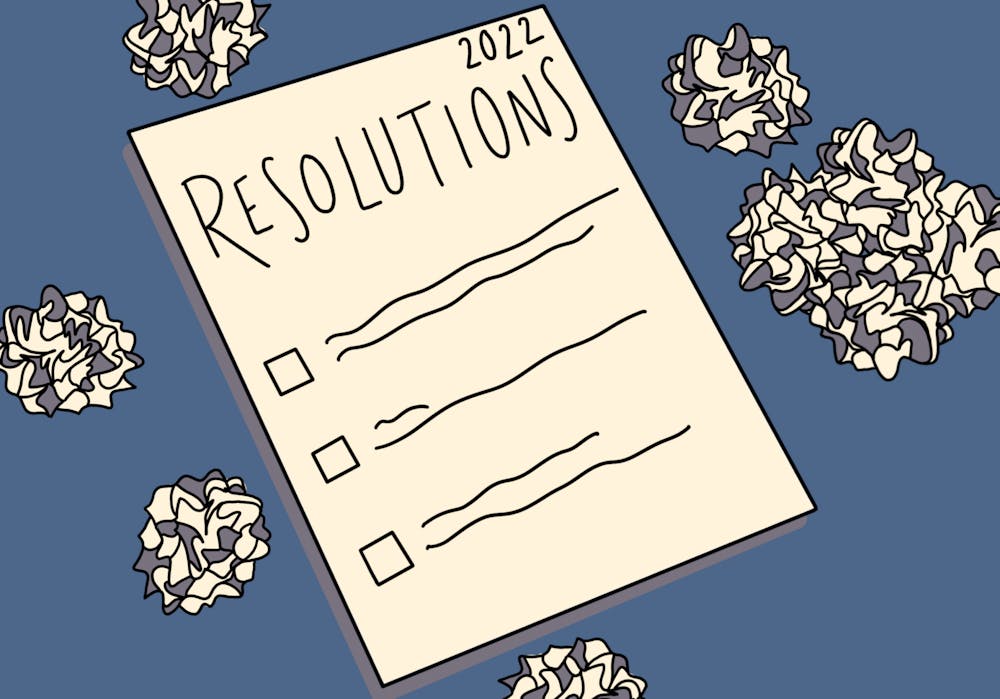The New Year season has always made me nervous. The catastrophic events of recent years, such as COVID-19 and the worsening of climate change, have induced skepticism about the future, leaving me suspicious of the year to come. Furthermore, Jan. 1 always seems to carry with it a set of expectations I cannot hope to live up to — staying out all night, celebrating the drop of a ball and the turning of calendars. It also carries with it the anticipation of New Year’s resolutions, which challenge us to better ourselves and to focus on what we can improve upon within our lives. The phrase, “new year, new me,” seems to perfectly encapsulate these phenomena.
However, what necessitates such an urgent and immediate change of identity? And why must it be confined to the first of January?
Whilst chatting with my mother over winter break, I realized something interesting. She asked me if I had been planning on writing New Year’s resolutions for 2022 — a question which I answered with a decisive “no.” She seemed surprised at my quick reaction, but the truth was, I had already considered the idea and chosen not to. The concept of committing to a large change of creating or abandoning deep-rooted habits for such a long period of time — all of 2022 — seemed too daunting to attempt. If I failed once during the year, or at least during January, the whole year might be ruined. There seemed to be so much pressure to carry through — pressure that I didn’t feel was worth taking on.
On the other hand, broad promises such as working out more or spending more time with family felt inaccessible and almost impossible. They toted no specific plans or safety nets in the case of failure or changes of circumstances, and it was hard to visualize how exactly they would fit in with my life. Finally, New Year’s resolutions never truly appeared to be in my best interest. The standard list of resolutions that society suggested, such as working out more or spending less time on my phone, didn’t take into account my specific circumstances or recognize any progress I had made the previous year.
However, as I thought about the question further, my homework planner came to mind. In it, while choosing classes for the spring semester, I had written out my ideal weekly schedule. I had chosen some priorities with which I would not allow classes to interfere — my social life, meditation and prayer and fitness — and worked out a time table which would make space for all of them while still allowing me to get my schoolwork done.
I soon recognized this “perfect” weekly schedule for what it was — a set of goals and priorities for the next phase of my life. Similar to New Year’s resolutions, my planner had been a canvas for vision casting, allowing me to reorient myself for a fresh start, or perhaps a set of “semester resolutions.” However, this task had not seemed daunting whatsoever. It was specific to my life, my wants and needs, and the realities of the upcoming season. Thus, I came to realize that long term goals needed to be specific to the individual, both in timing and in structure.
It’s no secret that a healthy individual needs to regularly set and revise goals for their life. On the contrary, I had come to understand that the reason New Year’s resolutions were so daunting, and perhaps so apt to fail, is that they are a universal concept attempting to fill the role of a very personal task. While a year is not a relevant time frame for most college students, the cycle of semesters and breaks is much more tangible when assessing habits. Furthermore, stereotypical New Year’s resolutions such as working out more, being more grateful or spending less time on social media, feel too broad or impersonal to be practical. Thus, molding resolutions to the yearly, monthly, or even weekly cycles of our lives make them much more approachable, and, hopefully, much more successful.
And so, though New Year’s is still not my favorite holiday, I’ve recognized the true purpose of resolutions in my daily life. Building on previous successes, goals serve to continually improve my way of life, helping me to adjust to changes in my circumstances and to better serve myself and those around me. I may not be writing New Year’s resolutions this year, or staying up much past midnight, but I’ve come to see the incredible value in the foundational ideas that surround New Year’s — recognizing, building upon and choosing to prioritize the important things in life.
Caitlyn Kelley is a Life Columnist for The Cavalier Daily. She can be reached at life@cavalierdaily.com.







